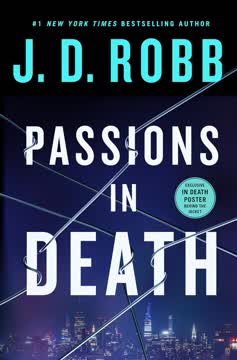Plot Summary
Dreams and Shadows of Guilt
Lieutenant Eve Dallas, a dedicated homicide detective, is haunted by a recent case where she was forced to kill, leaving her with guilt over a child she couldn't save. Her morning is a blur of exhaustion as she prepares for mandatory psychological Testing, a requirement after a termination. Despite the emotional toll, Eve is determined to return to duty quickly, driven by a need to be back on the streets and solve the next case.
A Murder on Broadway
Eve's commanding officer overrides her Testing schedule, assigning her to a high-profile murder case. The victim, Sharon DeBlass, is found brutally murdered in her apartment on Broadway. The scene is gruesome, with Sharon's body posed provocatively, and an antique gun left behind. Eve's investigation begins with her former partner Feeney, who warns her that the case will be politically sensitive due to the victim's family ties.
The Senator's Granddaughter
Sharon is revealed to be the granddaughter of a powerful senator, Gerald DeBlass, known for his conservative views. Eve learns that Sharon was a licensed companion, adding layers of complexity to the investigation. The senator's influence looms over the case, and Eve must navigate the political minefield while seeking justice for Sharon.
A Killer's Signature
As Eve delves deeper into the investigation, she finds a note left by the killer: "One of Six." This message suggests that Sharon's murder is part of a series, and Eve is racing against time to prevent further killings. The killer's use of an antique weapon and the meticulous staging of the crime scene indicate a methodical and arrogant perpetrator.
The Second Victim
A second victim, Lola Starr, is found murdered in a similar fashion. Lola, a young licensed companion, was killed with a silenced antique gun, and a video of her murder is sent to Eve. The killer's pattern is becoming clear, and Eve is haunted by the knowledge that there are more victims to come. The pressure mounts as she struggles to connect the dots between the victims and the killer.
Testing and Tensions
Eve is forced to confront her own demons during a mandatory psychological evaluation. The Testing is grueling, and Eve's past traumas are brought to the surface. Despite the emotional strain, she remains focused on the case, determined to catch the killer before he strikes again. Her interactions with Dr. Mira, the department's psychiatrist, reveal the depth of Eve's internal conflict.
Secrets Unravel in Virginia
After receiving a cryptic call, Eve rushes to Virginia with Roarke, suspecting a breakthrough in the case. They arrive at the DeBlass family home, where Catherine DeBlass, Sharon's aunt, is in distress. Catherine reveals a dark family secret: her father, Senator DeBlass, sexually abused her and Sharon. This revelation shakes the family to its core, exposing the senator's monstrous nature and providing Eve with the motive she needs to pursue justice.
A Deadly Confession
Catherine's admission of abuse and Sharon's blackmailing of their grandfather, Senator DeBlass, provides Eve with the evidence she needs. Sharon had threatened to expose the senator's crimes, leading to her murder. Catherine's courage in coming forward not only helps Eve's case but also begins her own path to healing. The confession is a turning point, shifting the investigation's focus and strengthening Eve's resolve to bring the senator to justice.
The Senator's Dark Legacy
With Catherine's testimony and Sharon's diaries, Eve builds a case against Senator DeBlass. The diaries reveal Sharon's manipulation of her grandfather, using his past abuse to extort money. The senator's public persona as a moral crusader crumbles under the weight of his private sins. Eve's investigation uncovers a pattern of abuse and murder, linking DeBlass to the deaths of Sharon and other victims, and exposing the hypocrisy of his political career.
A Calculated Betrayal
Derrick Rockman, DeBlass's aide, is revealed as the senator's accomplice. Rockman orchestrated the murders of Lola Starr and Georgie Castle to cover up Sharon's death and protect DeBlass's reputation. His loyalty to the senator is driven by ambition and a shared disdain for women. Rockman's confession, captured by Eve, exposes the calculated nature of the crimes and his role in perpetuating DeBlass's legacy of violence and control.
The Final Confrontation
Rockman confronts Eve in her apartment, intending to kill her to protect his and DeBlass's secrets. A tense struggle ensues, with Eve fighting for her life. Despite being injured, she outsmarts Rockman, capturing his confession on tape. The confrontation is a testament to Eve's resilience and determination, as she refuses to be a victim and ultimately brings Rockman to justice.
Justice and Redemption
With Rockman's confession and the evidence against DeBlass, Eve ensures that both men face the consequences of their actions. DeBlass's suicide prevents a public trial, but his crimes are exposed, and his political career is destroyed. Eve's victory is bittersweet, as she grapples with her own past and the parallels to the case. Through her perseverance, she finds a sense of closure and begins to heal, with Roarke by her side, offering support and understanding.
Characters
Eve Dallas
Lieutenant Eve Dallas is a dedicated homicide detective with the NYPSD. She is haunted by a recent case where she was forced to kill, and her guilt over a child she couldn't save weighs heavily on her. Despite her emotional turmoil, Eve is fiercely determined to solve the murder of Sharon DeBlass and prevent further killings. Her interactions with Roarke add complexity to her professional and personal life.
Roarke
Roarke is a wealthy and influential businessman with a mysterious past. He has connections to Sharon DeBlass's family and becomes a person of interest in the murder investigation. Despite his charm and apparent cooperation, Eve is wary of his potential involvement. Roarke's attraction to Eve complicates their interactions, and his knowledge of antique weapons raises questions about his role in the case.
Feeney
Captain Ryan Feeney is a seasoned detective and Eve's former partner. He now heads the Electronics Detection Division and provides valuable support in the investigation. Feeney's experience and technical expertise are crucial in analyzing the evidence, and his friendship with Eve offers her a sense of stability amid the chaos of the case.
Sharon DeBlass
Sharon DeBlass is the granddaughter of Senator Gerald DeBlass and a licensed companion. Her brutal murder sets off a high-profile investigation. Sharon's complex relationships with her family and her choice of profession add layers of intrigue to the case. Her death is the first in a series of killings, and her connection to Roarke raises questions about her involvement in blackmail.
Senator Gerald DeBlass
Senator DeBlass is a powerful political figure whose public persona as a moral crusader hides his dark past of abuse and murder. His crimes against his daughter and granddaughter are driven by a need for control and power. DeBlass's downfall is a result of his own hubris and the courage of those he victimized, as his legacy is destroyed by the truth.
Elizabeth Barrister
Elizabeth Barrister is Sharon's mother and a successful attorney. She is devastated by her daughter's death and struggles with guilt over their strained relationship. Elizabeth's request for Roarke to reach out to Sharon adds a personal connection to the investigation. Her insights into Sharon's character provide valuable context for Eve.
Lola Starr
Lola Starr is a young licensed companion and the second victim in the series of murders. Her death mirrors Sharon's in its brutality and method, and the video of her murder sent to Eve heightens the urgency of the investigation. Lola's murder confirms the killer's pattern and raises the stakes for Eve.
Dr. Mira
Dr. Mira is the department's psychiatrist and conducts Eve's psychological Testing. Her calm demeanor and sharp insights help Eve confront her own demons. Mira's understanding of human behavior provides valuable context for the investigation, and her interactions with Eve reveal the detective's internal struggles.
Derrick Rockman
Rockman is DeBlass's loyal aide, who orchestrates the murders of Lola Starr and Georgie Castle to protect the senator. His actions are motivated by ambition and a shared disdain for women. Rockman's betrayal and eventual capture by Eve highlight the calculated nature of the crimes and his willingness to do anything to maintain power.
Catherine DeBlass
Catherine DeBlass is a pivotal character whose confession of her father's abuse provides the breakthrough in Eve's investigation. Her bravery in revealing the truth about Senator DeBlass's crimes helps bring justice for Sharon and the other victims. Catherine's journey from victim to survivor is a testament to her strength and resilience, as she confronts her past and begins to heal.
Plot Devices
Antique Weapons
The use of antique weapons in the murders is a significant plot device, highlighting the killer's methodical and historical approach. The weapons' rarity and the brutality of their use add layers of complexity to the investigation. Roarke's collection of similar weapons raises questions about his involvement and provides a connection between the past and present.
Video Recordings
The video recordings of the murders, sent to Eve, serve as the killer's signature and a taunt to the police. The recordings' high quality and the killer's choice to share them with Eve indicate a desire for recognition and control. The videos heighten the urgency of the investigation and provide crucial evidence for Eve to analyze.
Political Pressure
The political pressure from Senator DeBlass and his influence over the investigation add a layer of complexity to the case. The senator's ambitions and his desire to control the narrative of Sharon's death create obstacles for Eve. The political implications of the murders and the potential for scandal raise the stakes for the investigation.
Psychological Testing
The mandatory psychological Testing provides insight into Eve's character and internal struggles. The Testing's grueling nature and the resurfacing of Eve's past traumas highlight her emotional turmoil. Dr. Mira's analysis of Eve's mental state adds depth to her character and underscores the personal challenges she faces in the investigation.
Sharon's Diaries
Sharon DeBlass's diaries are a crucial plot device, providing evidence of her grandfather's abuse and her subsequent blackmail. The diaries reveal the senator's crimes and Sharon's manipulation, serving as a catalyst for the investigation and the eventual downfall of DeBlass.
Confession and Redemption
Catherine DeBlass's confession of her father's abuse is a pivotal plot device that shifts the investigation and provides the evidence needed to pursue justice. Her courage in coming forward not only aids the case but also marks the beginning of her own redemption and healing.
Rockman's Betrayal
Derrick Rockman's role as DeBlass's accomplice is a significant plot device, revealing the calculated nature of the murders and the lengths he will go to protect the senator. His betrayal and eventual capture by Eve highlight the theme of ambition and the consequences of blind loyalty.
Analysis
"Naked in Death" by J.D. Robb is a gripping exploration of justice, power, and personal demons. Through the character of Eve Dallas, the novel delves into the complexities of a detective's life, haunted by past traumas yet driven by a relentless pursuit of justice. The narrative intertwines political intrigue with personal redemption, as Eve navigates a high-profile murder case that exposes the dark underbelly of power and abuse. The book highlights the resilience required to confront one's past and the courage needed to seek truth in the face of overwhelming odds. Through its intricate plot and well-developed characters, "Naked in Death" offers a compelling commentary on the nature of justice and the human capacity for healing and redemption.
Last updated:
FAQ
Synopsis & Basic Details
What is Naked in Death about?
- A Future Noir Mystery: Naked in Death introduces Lieutenant Eve Dallas, a homicide detective in a futuristic New York City, as she investigates the brutal murder of Sharon DeBlass, a licensed companion and granddaughter of a powerful senator. The case quickly escalates into a hunt for a serial killer who leaves cryptic messages and antique weapons at his meticulously staged crime scenes.
- Unlikely Partnership Forms: Forced to navigate a politically charged investigation, Eve finds herself clashing with, and unexpectedly drawn to, Roarke, a mysterious and immensely wealthy Irish businessman who becomes a prime suspect due. Their complex relationship develops against the backdrop of the escalating murder spree.
- Confronting Personal Demons: As Eve races against time to stop the killer, she is also forced to confront her own traumatic past, including a recent justifiable homicide and deeply buried childhood abuse. The investigation becomes a crucible for her personal and professional identity, intertwining her quest for justice with her journey toward healing.
Why should I read Naked in Death?
- Compelling Protagonist's Journey: Readers are drawn into Eve Dallas's raw, unvarnished psyche as she battles both external criminals and internal demons. Her relentless pursuit of justice, coupled with her vulnerability and struggle with past trauma, makes her a deeply relatable and inspiring character, offering a profound exploration of resilience.
- Intriguing Futuristic World-Building: J.D. Robb crafts a richly detailed 2058 New York City, blending advanced technology like AutoChefs, tele-links, and VR with enduring human elements like crime, politics, and love. This blend creates a captivating backdrop that feels both familiar and excitingly new, enhancing the mystery with a unique atmosphere.
- Electrifying Romantic Tension: The dynamic between Eve and Roarke is a central draw, evolving from intense suspicion to undeniable passion. Their intellectual sparring, emotional vulnerability, and burgeoning trust create a powerful romantic arc that complements the thrilling mystery, making it a foundational read for fans of romantic suspense.
What is the background of Naked in Death?
- Futuristic Dystopian Undercurrents: The story is set in 2058, a future where societal reforms have legalized prostitution ("licensed companions") and banned most firearms, yet violence and corruption persist. This backdrop highlights the novel's exploration of whether technological and social advancements truly solve fundamental human failings, or merely shift their manifestations.
- Technological Integration & Critique: The world features ubiquitous personal computers, advanced security systems, automated services, and virtual reality, reflecting a society deeply integrated with technology. However, the killer's ability to manipulate these systems (e.g., doctored security discs, untraceable communications) subtly critiques the illusion of perfect control and privacy in a high-tech era.
- Political & Moral Landscape: The narrative is steeped in a political climate where conservative figures like Senator DeBlass wield immense power, advocating for "Morals Bills" and lamenting societal decline, even as they harbor deep personal corruption. This creates a stark contrast between public morality and private depravity, underscoring themes of hypocrisy and the enduring struggle between individual freedom and societal control.
What are the most memorable quotes in Naked in Death?
- "What's past is prologue.": This epigraph, attributed to William Shakespeare, immediately sets a thematic tone for Eve's journey, suggesting that her past traumas and the societal history of violence are not merely background but active forces shaping the present investigation and her personal development. It foreshadows the deep connections between past abuse and present crimes.
- "Violence is as American as cherry pie.": The second epigraph, from Rap Brown, offers a cynical, yet poignant, commentary on the enduring presence of violence despite societal advancements. It challenges the futuristic setting's veneer of progress, implying that certain human tendencies, particularly towards aggression, remain constant across eras.
- "I'm a cop. I can't afford to overlook anything, to assume anything.": Spoken by Eve to Roarke, this quote encapsulates her unwavering dedication to her professional ethics and her struggle to maintain objectivity, especially when her personal feelings become involved. It highlights her core identity and the immense personal cost of her commitment to justice.
What writing style, narrative choices, and literary techniques does J.D. Robb use?
- Third-Person Limited Perspective: The narrative primarily follows Eve Dallas's point of view, immersing readers in her thoughts, fears, and deductions. This choice allows for deep psychological insight into Eve's character, making her internal struggles and emotional growth central to the story, while maintaining the mystery by limiting access to other characters' inner worlds.
- Sharp, Economical Prose with Vivid Detail: Robb employs a direct and efficient writing style, characterized by concise sentences and impactful descriptions that quickly establish the futuristic setting and the grim realities of Eve's work. Despite its economy, the prose is rich in sensory details, from the "heavy hum of air traffic" to the "smell of cold, fresh earth," grounding the reader in Eve's world.
- Juxtaposition of Gritty Realism and Futuristic Romance: A key technique is the stark contrast between the brutal, often disturbing details of homicide investigation and the burgeoning, intensely passionate romance between Eve and Roarke. This juxtaposition heightens the emotional stakes, demonstrating how love and connection can emerge even in the darkest circumstances, and providing moments of tenderness amidst the violence.
Hidden Details & Subtle Connections
What are some minor details that add significant meaning?
- Eve's Faulty Car Heater: A seemingly trivial detail, Eve's constantly malfunctioning car heater (Document 1, Chapter 2, 5, 7) symbolizes her often uncomfortable, unglamorous life and her resistance to accepting help or luxury. Roarke's later act of secretly fixing it (Document 1, Chapter 15) is a subtle, non-verbal expression of care and understanding, highlighting his desire to provide comfort without her asking, a stark contrast to her self-reliance.
- Roarke's Kept Button: Roarke finding and keeping a button from Eve's drab gray suit (Document 1, Chapter 5, 14) is a potent symbol of his immediate, almost possessive fascination with her, even before their physical intimacy. It signifies his attention to small details about her and his unconventional attraction to her unadorned authenticity, foreshadowing his deep emotional investment.
- Sharon's Shoe Arrangement: Eve's meticulous observation that Sharon DeBlass's shoes were stacked in rows of four, not six (Document 1, Chapter 7), is a crucial, subtle detail that proves someone returned to the crime scene after the initial police sweep. This seemingly insignificant discrepancy becomes a vital clue, revealing the killer's arrogance and the depth of his planning, and validating Eve's sharp observational skills.
What are some subtle foreshadowing and callbacks?
- "Daddy" Motif and Lola Starr: Lola Starr's preference for clients who call her "Daddy" (Document 1, Chapter 4) subtly foreshadows the later revelation of Senator DeBlass's incestuous abuse of his daughter and granddaughter. This seemingly innocent detail becomes a chilling callback to the core trauma driving the entire murder spree, linking the victims' professional lives to the killer's twisted motivations.
- Roarke's "Old-Fashioned Quirk": Roarke's statement that he has an "old-fashioned quirk" of disliking "brutalizing women, in any form" (Document 1, Chapter 5) subtly foreshadows his innocence in the brutal murders. While initially a suspect, this personal code, combined with his later fury at the graphic photos of Lola Starr, establishes his moral boundaries and distinguishes him from the actual killer.
- Eve's Apartment Ownership: The revelation that Roarke owns Eve's apartment building (Document 1, Chapter 4) is a subtle power dynamic that initially makes him more suspicious but later becomes a symbol of his protective presence. His ability to access her apartment (Document 1, Chapter 8) shifts from a potential threat to a demonstration of his unwavering commitment to her, even when she pushes him away.
Who are the most significant supporting characters?
- Captain Ryan Feeney: Beyond his role as Eve's former partner and EDD chief, Feeney serves as Eve's moral compass and emotional anchor within the police force. His unwavering loyalty and willingness to bend rules for Eve (e.g., checking Roarke's background, providing emotional support during her breakdown) highlight the theme of found family and trust in a corrupt system.
- Dr. Mira: The police psychiatrist, Dr. Mira, is crucial not only for Eve's mandatory psychological Testing but also for providing the killer's profile. Her calm, insightful demeanor and ability to see through Eve's defenses (Document 1, Chapter 9) offer a professional counterpoint to Eve's raw emotions, symbolizing the importance of psychological understanding in both solving crimes and personal healing.
- Summerset, Roarke's Butler: Summerset, with his "implacably eyed" and "smug condescension" (Document 1, Chapter 5), acts as a gatekeeper and a foil to Eve, initially embodying the class divide and Roarke's privileged world. His gradual, subtle acceptance of Eve (e.g., putting her calls through to Roarke on FreeStar One, Document 1, Chapter 13) signifies Eve's growing importance in Roarke's life and the breaking down of social barriers.
Psychological, Emotional, & Relational Analysis
What are some unspoken motivations of the characters?
- Eve's Need for Control: Eve's relentless drive to solve cases and her aversion to psychological Testing stem from an unspoken, deep-seated need for control, a direct consequence of her traumatic, powerless childhood (Document 1, Chapter 9, 18). This motivation fuels her dedication but also creates emotional walls, making her reluctant to relinquish control in personal relationships or acknowledge her own vulnerabilities.
- Roarke's Desire for Connection: Beneath his enigmatic charm and immense wealth, Roarke is driven by an unspoken desire for genuine connection and a challenge that transcends material gain. His persistence with Eve, despite her initial hostility and professional boundaries, reveals his longing for a partner who is his intellectual and emotional equal, someone who "pulls something from me" (Document 1, Chapter 16).
- Senator DeBlass's Power-Hunger: Senator DeBlass's public moral crusades and political ambitions are deeply intertwined with an unspoken, perverse need for absolute power and control, particularly over women and his family. His abuse and subsequent murders are not just about sex or blackmail, but about maintaining a facade of moral authority while indulging his darkest desires, as revealed by Catherine's confession (Document 1, Chapter 17).
What psychological complexities do the characters exhibit?
- Eve's Trauma-Induced Amnesia and Coping Mechanisms: Eve exhibits complex psychological responses to her childhood trauma, including amnesia regarding her first eight years and a fierce dedication to her job as a coping mechanism (Document 1, Chapter 9, 18). Her internal conflict between professional detachment and emotional vulnerability, particularly after witnessing child abuse, highlights the psychological toll of her work and her struggle to integrate her past with her present identity.
- Roarke's Calculated Empathy and Protective Instincts: Roarke, despite his ruthless business acumen and mysterious past, displays a complex blend of calculated empathy and fierce protective instincts towards Eve. His ability to "read people quickly and accurately" (Document 1, Chapter 6) allows him to understand Eve's emotional state, and his actions, from fixing her heater to confronting Rockman, reveal a deep-seated need to care for her, challenging his own self-proclaimed aloofness.
- Rockman's Twisted Loyalty and Narcissistic Grandiosity: Derrick Rockman's character is a study in twisted loyalty and narcissistic grandiosity, believing himself to be the true architect of DeBlass's political power and the murders. His disdain for women and his enjoyment of the killings (Document 1, Chapter 19) reveal a profound sociopathy, where his actions are driven by a need for recognition and control, seeing himself as superior to both his victims and his "pawn" (Eve).
What are the major emotional turning points?
- Eve's Breakdown with Roarke: The most significant emotional turning point occurs when Eve, overwhelmed by the child murder case and her own resurfacing trauma, breaks down in front of Roarke (Document 1, Chapter 7). This moment of raw vulnerability shatters her carefully constructed emotional walls, allowing Roarke to see her true pain and initiating a profound shift in their relationship from professional suspicion to deep personal connection.
- Catherine DeBlass's Confession: Catherine's agonizing confession of her father's abuse (Document 1, Chapter 17) is a pivotal emotional turning point for the entire DeBlass family and for Eve. It transforms the case from a series of seemingly random murders into a deeply personal quest for justice against a monstrous figure, igniting Eve's protective instincts and solidifying her resolve.
- Roarke's Declaration of Love: Roarke's unexpected declaration, "I think I'm in love with you" (Document 1, Chapter 15), marks a major emotional shift, not just for Eve but for himself. It forces Eve to confront her own capacity for deep emotional connection, challenging her long-held belief that such feelings are a weakness, and signaling a new, vulnerable phase in both their lives.
How do relationship dynamics evolve?
- Eve and Roarke: From Adversaries to Intimates: Their relationship dynamically evolves from initial professional suspicion and intellectual sparring to a passionate, deeply intimate bond. Eve's initial distrust of Roarke, fueled by his status as a suspect and his mysterious nature, gradually gives way to grudging respect, then intense attraction, and finally, a profound emotional and physical connection built on mutual understanding and vulnerability (Document 1, Chapter 3, 10, 15).
- Eve and Feeney: Deepening Professional Trust: The long-standing partnership between Eve and Feeney deepens into an unbreakable bond of professional and personal trust. Feeney's unwavering support, his willingness to risk his career for Eve, and his emotional concern for her well-being (Document 1, Chapter 11) highlight their loyalty, evolving beyond mere colleagues to a familial connection that provides Eve with crucial stability.
- DeBlass Family: Exposure of Toxic Dynamics: The DeBlass family dynamics are revealed to be deeply toxic and abusive, evolving from a facade of respectability to public exposure of incest and murder. The strained relationships between Senator DeBlass and his children, particularly Catherine and Sharon, unravel to expose a pattern of control, fear, and silence, ultimately leading to their collective breakdown and the senator's downfall (Document 1, Chapter 17, 18).
Interpretation & Debate
Which parts of the story remain ambiguous or open-ended?
- The Full Extent of Eve's Childhood Trauma: While Eve's childhood abuse is revealed, the specific details of her first eight years remain largely ambiguous due to her amnesia (Document 1, Chapter 9, 18). This open-endedness leaves room for future exploration in the series, suggesting that her healing journey is ongoing and that the full psychological impact of her past is yet to be fully understood.
- Roarke's Complete Past and Moral Ambiguity: Despite revealing snippets of his past as a thief and smuggler (Document 1, Chapter 15), Roarke's full history remains largely ambiguous. His immense wealth, shadowy connections, and willingness to operate outside legal boundaries (e.g., hacking Simpson's accounts) leave a lingering question about the true nature of his morality and how much of his past he has truly left behind.
- The Future of Justice in a Corrupt System: While Senator DeBlass and Rockman are brought to justice, the story leaves open the question of whether the systemic corruption (e.g., Chief Simpson's blackmail, political interference) will truly be eradicated. The ease with which powerful figures manipulate the system suggests an ongoing struggle, implying that Eve's fight for justice is a continuous battle against entrenched power structures.
What are some debatable, controversial scenes or moments in Naked in Death?
- Eve's Decision to Sleep with Roarke While He's a Suspect: Eve's choice to engage in a sexual relationship with Roarke while he is still a primary suspect (Document 1, Chapter 10) is highly debatable from an ethical and professional standpoint. This controversial moment challenges traditional police procedural norms, highlighting Eve's impulsive nature and the intense, undeniable attraction that overrides her professional judgment, leading to significant career repercussions.
- The Justification of Hacking for Justice: Roarke's illegal hacking into Chief Simpson's financial records (Document 1, Chapter 16) to uncover blackmail evidence, at Eve's request, presents a controversial ethical dilemma. It raises questions about whether "the ends justify the means" in the pursuit of justice, blurring the lines between legal and illegal methods and challenging the integrity of the system Eve is sworn to uphold.
- The Portrayal of Prostitution as a "Licensed Companion" Profession: The novel's depiction of prostitution as a legalized, regulated profession for "licensed companions" (Document 1, Chapter 1) is a controversial aspect. While presented as a societal advancement for safety and health, the murders of these women, and the underlying disdain for them by characters like Rockman and DeBlass, spark debate about whether legalization truly elevates the profession or merely sanitizes its inherent vulnerabilities and societal stigmas.
Naked in Death Ending Explained: How It Ends & What It Means
- Justice Achieved, But Not Without Cost: The ending sees Senator DeBlass exposed as a serial abuser and murderer, committing suicide to avoid public humiliation, while his accomplice, Derrick Rockman, is captured and charged (Document 1, Chapter 19, 20). This brings a measure of justice for the victims, but DeBlass's suicide denies a public trial, leaving a bittersweet taste and highlighting the limitations of the legal system against powerful individuals.
- Eve's Personal Breakthrough and Healing: The climax forces Eve to confront her own childhood trauma, triggered by Rockman's taunts and the parallels to DeBlass's crimes (Document 1, Chapter 19, 20). Her violent outburst against Rockman and subsequent emotional breakdown with Roarke mark a significant personal breakthrough, allowing her to finally articulate her past abuse. This moment signifies the beginning of her healing journey, moving from suppressed pain to acknowledged vulnerability.
- Roarke and Eve's Relationship Solidified: Roarke's unwavering support during Eve's breakdown, his protective actions, and his explicit declaration of love (Document 1, Chapter 19, 20) solidify their relationship. The ending establishes them as a committed couple, with Roarke offering Eve a safe space and emotional anchor, symbolizing that even in a world of darkness and trauma, profound connection and love can be found and cherished.
Review Summary
Naked in Death receives mostly positive reviews, with readers praising the futuristic setting, strong characters, and intriguing mystery. Many appreciate Eve Dallas as a complex, tough protagonist and find Roarke compelling. The romance develops quickly, which some enjoy and others find too fast. Readers highlight the well-crafted plot, suspense, and world-building. Some criticize predictability or dislike certain character aspects. Overall, most reviewers express enthusiasm for continuing the series, finding it addictive and entertaining.
In Death Series Series
Similar Books
Download PDF
Download EPUB
.epub digital book format is ideal for reading ebooks on phones, tablets, and e-readers.



















